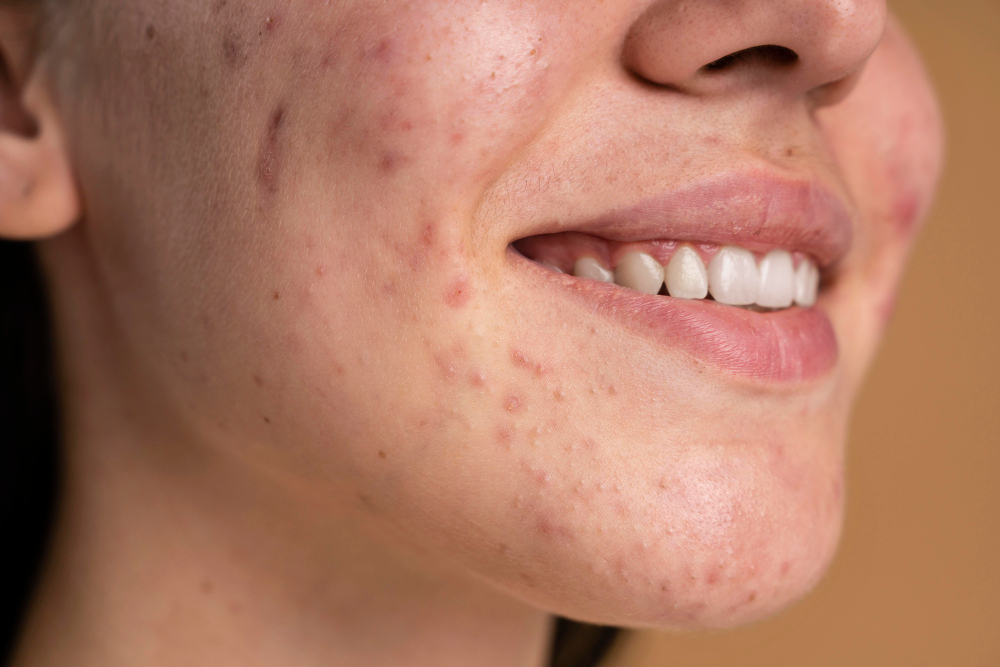Can Colostrum Help with Hormonal Acne? A Deep Dive

Hormonal acne is a common and frustrating skin condition that many people face, particularly during periods of hormonal fluctuations such as puberty, menstruation, pregnancy, and menopause. It’s a type of acne that’s often resistant to traditional treatments and can persist for years, leading to physical discomfort and emotional distress. In the search for effective and natural remedies, colostrum has emerged as a potential solution. But can colostrum really help with hormonal acne? This article takes a deep dive into what colostrum is, how it works, and whether it’s a viable option for those struggling with this stubborn form of acne.
Understanding Hormonal Acne
Before exploring the potential benefits of colostrum, it’s important to understand what hormonal acne is and how it differs from other types of acne. Hormonal acne is caused by fluctuations in hormone levels, particularly androgens like testosterone, which can increase oil production in the skin. This excess oil, combined with dead skin cells, clogs pores and creates an environment where acne-causing bacteria can thrive.
Hormonal acne typically appears on the lower part of the face, including the jawline, chin, and neck. It often manifests as deep, cystic bumps that are painful to the touch and can be difficult to treat with over-the-counter acne products. Common triggers include menstrual cycles, pregnancy, polycystic ovary syndrome (PCOS), and stress—all of which can cause hormonal imbalances that lead to breakouts.
What is Colostrum?
Colostrum is the first form of milk produced by mammals immediately following the birth of their young. Rich in antibodies, growth factors, and nutrients, colostrum is often referred to as “liquid gold” for its numerous health benefits. In humans, colostrum is produced in the first few days after childbirth and plays a crucial role in bolstering the newborn’s immune system.
Bovine colostrum, derived from cows, is commonly used in supplements due to its similar composition to human colostrum and its rich concentration of bioactive compounds. These include immunoglobulins, lactoferrin, and growth factors like IGF-1, which contribute to its reputation as a potent health supplement. Colostrum is widely used for immune support, gut health, and even athletic performance, but its potential benefits for skin health, particularly in relation to acne, have also garnered attention.
How Does Colostrum Work on Acne?
The potential of colostrum to combat acne lies in its unique composition. Let’s break down the key components that may make it effective against hormonal acne:
- Immunoglobulins and Antimicrobial Properties:
- Colostrum is rich in immunoglobulins, which are antibodies that help fight infections by neutralizing pathogens like bacteria and viruses. Since acne is often exacerbated by bacterial overgrowth on the skin, the antimicrobial properties of colostrum could help reduce the presence of acne-causing bacteria, thereby preventing breakouts.
- Anti-Inflammatory Effects:
- Inflammation is a major factor in the development of acne, especially the painful, cystic type associated with hormonal imbalances. Colostrum contains various anti-inflammatory compounds, such as lactoferrin and growth factors, which can help reduce inflammation in the skin. This, in turn, may decrease the severity and redness of acne lesions.
- Growth Factors for Skin Healing:
- Colostrum is abundant in growth factors like IGF-1, which are crucial for tissue repair and regeneration. These growth factors can promote the healing of acne scars and help in the renewal of damaged skin cells. For those dealing with the aftermath of severe hormonal acne, this can be particularly beneficial.
- Support for Gut Health:
- The gut-skin connection is an emerging area of research, with studies suggesting that gut health can significantly impact skin conditions, including acne. Colostrum is known to support gut health by promoting a balanced microbiome and healing the intestinal lining. A healthy gut can reduce systemic inflammation and improve nutrient absorption, which may indirectly benefit skin health and reduce acne.
- Hormonal Regulation:
- While colostrum itself doesn’t directly regulate hormones, its ability to reduce inflammation and support overall health can contribute to a more balanced hormonal environment. By promoting general well-being, colostrum may help mitigate some of the factors that lead to hormonal imbalances, thereby reducing the likelihood of hormonal acne.
Colostrum and Hormonal Acne: What Does the Research Say?
Although there is a wealth of anecdotal evidence supporting the use of colostrum for acne, scientific research specifically targeting hormonal acne is limited. However, the existing studies on colostrum’s impact on skin health are promising.
For instance, a study published in the Journal of Clinical & Aesthetic Dermatology found that lactoferrin, a protein found in colostrum, significantly reduced acne lesions in participants after eight weeks of supplementation. The anti-inflammatory and antibacterial properties of lactoferrin were credited for this improvement. While this study didn’t focus exclusively on hormonal acne, the results suggest that colostrum’s components could be beneficial for all types of acne, including hormonal varieties.
Another study published in the International Journal of Dermatology explored the use of colostrum in combination with other natural ingredients for acne treatment. The researchers concluded that colostrum could effectively reduce acne severity due to its multifaceted approach, including immune modulation and skin repair. Again, while the study didn’t isolate hormonal acne, the findings are relevant to anyone suffering from acne caused by hormonal fluctuations.
Practical Considerations: How to Use Colostrum for Hormonal Acne
If you’re considering colostrum as a treatment for hormonal acne, it’s important to understand how to use it effectively. Here are some practical tips:
- Choose the Right Form:
- Colostrum is available in various forms, including powders, capsules, and topical creams. For acne treatment, a combination of oral supplementation and topical application may provide the best results. Oral colostrum can support your immune system and gut health, while topical products can target acne directly on the skin.
- Dosage and Frequency:
- When using colostrum supplements, follow the recommended dosage on the product label or consult a healthcare provider for personalized advice. Typically, a daily dose of 1-2 grams of colostrum powder or capsules is considered safe and effective. For topical application, apply colostrum cream to the affected areas once or twice daily.
- Be Patient:
- Like any natural remedy, colostrum may take time to show visible results. It’s important to be consistent with your use and give it at least 4-6 weeks to determine its effectiveness. Hormonal acne can be persistent, so patience is key.
- Monitor Your Skin’s Reaction:
- While colostrum is generally well-tolerated, it’s possible to experience skin irritation or allergic reactions, especially if you have sensitive skin. Start with a patch test before applying colostrum cream to your face, and discontinue use if you notice any adverse reactions.
- Consider a Holistic Approach:
- Colostrum can be a valuable part of your acne-fighting toolkit, but it’s most effective when used in conjunction with other healthy habits. Maintaining a balanced diet, managing stress, getting regular exercise, and following a gentle skincare routine can all contribute to clearer skin.
Addressing Concerns: Does Colostrum Cause Acne?
One question that often arises is whether colostrum could potentially cause acne. While there is no evidence to suggest that colostrum directly causes acne, it’s important to note that everyone’s skin reacts differently to new products. In some cases, introducing a new supplement or topical treatment can temporarily worsen acne as the skin adjusts. This is often referred to as “skin purging” and is usually short-lived. However, if you notice a sustained increase in breakouts after using colostrum, it may be worth consulting a dermatologist to rule out any underlying issues or sensitivities.
Conclusion
Colostrum is a promising natural remedy for hormonal acne, thanks to its anti-inflammatory, antimicrobial, and skin-healing properties. While more research is needed to fully understand its impact on hormonal acne specifically, the existing evidence suggests that colostrum could be a valuable addition to your skincare routine. Whether you choose to use it as a supplement or in a topical form, colostrum offers a multi-faceted approach to tackling the root causes of acne, promoting clearer, healthier skin from the inside out.
As with any treatment, it’s important to approach colostrum with realistic expectations and patience. Hormonal acne can be challenging to manage, but with consistent use and a holistic approach to skin health, colostrum may provide the relief you’ve been seeking.







